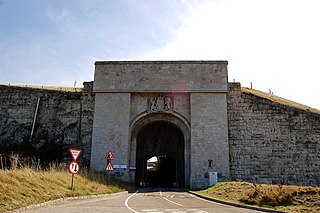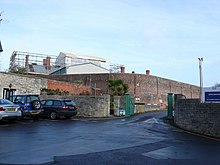
HM Prison Shrewsbury was a category B/C men's prison in Shrewsbury, Shropshire, England. It was decommissioned in March 2013, and is now open to the public.

HM Prison The Verne is a Category C men's prison located within the 19th-century Verne Citadel on the Isle of Portland in Dorset, England. Operated by His Majesty's Prison Service, HMP The Verne was established in 1949 and occupies the southern part of the citadel. After a brief spell as an Immigration Removal Centre in 2014–2017, HMP The Verne re-opened in 2018.

HMP Weare was an Adult Male/Category C prison ship berthed in Portland Harbour in Dorset, England. It was the latest in a lengthy history of British prison ships, which included HMS Maidstone, used as a prison during Operation Demetrius in the 1970s, HMS Argenta, in use as a prison in the 1920s, and a long list of British prison hulks dating from the late 18th century to the mid-19th century.
HM Prison Acklington was a Category C men's prison, located near the village of Acklington, in Northumberland, England. Acklington Prison was operated by Her Majesty's Prison Service. In 2011 Acklington was merged into the newly named HM Prison Northumberland.

HM Prison Durham is a Georgian era reception Category B men's prison, located in the Elvet area of Durham in County Durham, England. Built in 1819, the prison is operated by His Majesty's Prison Service. Its women prisoners were all moved out to other prisons in 2005 due to overcrowding and suicides.

HM Prison Kirklevington Grange is a Category D men's prison, located in the village of Kirklevington, in North Yorkshire, England. The prison is operated by His Majesty's Prison Service.

HMP Isle of Wight – Camp Hill Barracks is a former Category C men's prison, located on the outskirts of Newport, Isle of Wight. The former prison lies adjacent to Albany and Parkhurst, both part of HMP Isle of Wight.

HMP Hull is a Category B men's local prison located in Kingston upon Hull in England. The term 'local' means that this prison holds people on remand to the local courts. The prison is operated by His Majesty's Prison Service.

HM Prison Northallerton was a prison in Northallerton, North Yorkshire, England. It operated from 1788 until December 2013. During that time, it variously housed male and female adult prisoners, women with children, youth offenders, and military prisoners. Latterly Her Majesty's Prison Service struggled to keep the old prison operating to modern standards, and citing the costs of doing so and the relatively small size of the institution, it closed the prison in 2014. The prison was bought by Hambleton District Council, which is currently redeveloping the site.

HM Prison Bullwood Hall is a former Category C women's prison and Young Offenders Institution, located in Hockley, Essex, England. The prison was operated by His Majesty's Prison Service.

HM Prison Kingston is a former Category B/C men's prison, located in the Kingston area of Portsmouth, in Hampshire, England. Prior to closure, the prison was operated by Her Majesty's Prison Service. In 2020, work began to convert the site to residential use.

HM Prison Liverpool is a category B local men's prison in Walton, Liverpool, England. It is operated by His Majesty's Prison Service.

HM Prison Blundeston was a Category C men's prison, located in the Village of Blundeston in Suffolk, England. The prison was operated by Her Majesty's Prison Service, and closed in January 2014.

HMP Canterbury is a former prison in Canterbury, Kent, England. The prison was operated by Her Majesty's Prison Service. The former prison site was bought by Canterbury Christ Church University in April 2014.

HM Prison Channings Wood is a Category C men's prison, located in the parish of Ogwell in Devon, England. The prison is operated by His Majesty's Prison Service.
HM Prison Featherstone is a Category C men's prison, located in the village of Featherstone, in Staffordshire, England. The prison is operated by His Majesty's Prison Service.
HM Prison Kennet was a Category C men's prison, located in Parkbourn, Maghull, in the Metropolitan Borough of Sefton in Merseyside, England. The prison was operated by Her Majesty's Prison Service. The prison closed on 23 December 2016

HM Prison Preston is a Category B men's prison, located in the City Centre area of Preston in Lancashire, England. The prison is operated by His Majesty's Prison Service.

HM Prison Gloucester was a Category B men's prison located in Gloucester, Gloucestershire, England. It was originally opened in 1792, on the site of Gloucester Castle whose keep had been used as a prison.

The Closure of Prisons Order 2014 is a statutory instrument of the Parliament of the United Kingdom. The order closed several prisons in England.



















